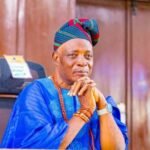By Victor Anazonwu
Across many Igbo communities in southern Nigeria, oral tradition recalls an ancient conflict between two neighbors. The story, remembered as “Agha Idu n’Oba” (The War Between Idu and Oba), speaks of a once-flourishing community (Idu) which vanished as a consequence of war but whose name and memory still ripple through history.
In the legend, Idu is clearly located in the Western frontiers of Igboland next door to Bini—the ancient Benin Kingdom. How do we know? Because the legend is loudest among the Western Igbo; and is said to have triggered the well-known migration story of Eze Chima Eastward. That migration left bold footprints in the sands of time.
Who is on the other side of the conflict, referred to as “Oba”? Well, there’s only one kingdom, among many which directly border Igboland, whose sovereign was (still is) called Oba – and that is Bini. When oral traditions, geography, and ethnography converge, the evidence is ironclad.
wo main versions of the story have endured through the generations.
In one account, it is said that an Oba came to the throne of Bini who demanded tribute from the neighboring people of Idu. They refused, triggering a series of violent confrontations. In the ensuing turmoil, the people of Idu chose migration over submission.
A second version tells of a more personal provocation: the Oba’s mother, while gathering firewood, allegedly strayed into an Idu farmland. When confronted by locals, an argument ensued during which she was insulted or perhaps roughly handled. The Oba, enraged, unleashed his army in vengeance. Idu was crushed, and its people fled in panic into surrounding territories.
As with most oral traditions, the truth lies somewhere in-between the different versions. Historians understand that great events rarely spring from a single cause. They are usually the result of converging political, social, and personal factors that build up over time.
In this instance, a plausible explanation that a powerful Benin Kingdom, under an expansionist Oba, sought to extend its influence eastward. Idu, being a prosperous neighbor, naturally became a target. Skirmishes occurred. In the interval before the Oba’s plan fully materialized, the incident involving the Queen mother probably happened – igniting the inferno. So, there were likely both remote and immediate causes at work – simultaneously.
Who was the Oba in question? Bini oral traditions point unmistakably to Oba Esigie who reigned approximately between 1504 and 1550 CE. The same oral traditions corroborate a “falling out” between Esigie and a highly respected Igbo native doctor known among the Bini as Inkwin which led to the latter’s departure. That “Inkwin” is a perfect profile match with Eze Chima is no longer in doubt.
Prior to the war, both sides appear to have coexisted peacefully—intermarrying, trading, and sharing customs. This mutually beneficial interaction explains the emergence of Eze Chima as a medicine man who once cured a Bini king of a grave illness and was given royal privileges in appreciation.
Ambition Meets Resistance
When Bini imperial ambition finally turned toward Idu, resistance was inevitable. The Idu people, proud and self-governing, resisted subjugation. For Eze Chima, whose personal friendship with the Benin court may have once been strong, the aggression was not only political but deeply personal. It was like being an Israelite under a Pharaoh who did not know Joseph. Migration, though painful, became both a protest and a preservation of dignity. He gathered his family and followers and journeyed Eastward, away from the war zone. Others fled in different directions. Idu lay desolate, wiped away from existence, but not from history.
Where Then Was Idu?
By tracing Eze Chima’s path through the very communities his followers later established, overlaying that movement on the physical geography of the region, and weighing the legend that places ancient Idu within whispering distance of Bini, a compelling conclusion emerges. The lost city of Idu almost certainly lies buried beneath the broad plains stretching between present-day Agbor and Igbanke.
The Igbo Spirit of Defiance
In many ways, this ancient story mirrors a consistent trait in Igbo history—their instinctive rejection of both internal and external domination. Like the Germans before 1870, the Igbo never evolved large, centralized political systems capable of mobilizing vast armies – be it for internal control, conquest, deterrence or defense. Instead, they preferred to live in smaller communities governed through councils of elders and consensus-based decision-making.
Igbo communities were designed for commerce and free enterprise, not war. Widely tagged ”republican,” this choice of political decentralization made them both unaccustomed and resistant to autocratic leadership. It also left them militarily vulnerable.
That structure may have been Idu’s undoing. Lacking a single, unified power capable of matching Benin’s might, the community succumbed to invasion. Yet its dispersal gave birth to a new wave of settlements.
Monarchy: A Political Response to Bitter Memories
Nearly all the towns founded by Eze Chima and his followers subsequently developed monarchies of their own. This stands in contrast to most other Igbo communities, which retained strong republican traditions. The shift was not accidental. It was likely a cultural reflex born of experience: a conscious decision never again to be undone by the absence of strong central leadership.
Thus, out of the ashes of Idu’s misfortune arose a new quasi-aristocratic tradition that still endures in these communities and has been adopted by several others across Igboland to this day.
Who Was Eze Chima Within Idu Society?
Eze Chima’s name offers important clues about his status within Idu before it became defunct. In Igbo, Eze means “king.” It is rarely used as a given or first name, except as a shortened nickname from a longer first name like Ezenwa (“A child with royal attributes”). If that was the case, it was uncommon to use “Eze” in conjunction with another name, Chima.
Alternatively, “Eze Chima” was a pointer to royal title, meaning King Chima. But the Igbo king is more of a board chairman than a sovereign ruler; a convener and moderator rather than a dictator. “Chima,” meaning “God knows,” was clearly his personal name.
In the centuries before the coming of British colonial rule, adult Igbo men were referred to by their own given names. Like “Okonkwo” or “Obierika” in Chinua Achebe’s Things Fall Apart. By way of description, they may be said to be “son of…” Social titles like “Ichie”or “Ozo” or “Eze” may be added in adult life. Sometimes those titles or aliases overshadow given names. Surnames were not common usage. So, “Eze” was most probably a title of authority or mark of reverence added to Chima in adult life. It points to his social accomplishments – not family name.
Most accounts agree that he was a highly successful medicine man. In traditional Igbo and African society, medicine men stood at the intersection between healer (doctor), diviner.and priest. They were among the most revered and influential professionals of their time. Nobility courted them. Commoners feared them. Everyone respected them, especially as they were believed to have magical powers. For Eze Chima to have been reputed as a highly accomplished medicine man who once healed a Bini king means he was top elite. Probably, headman at Idu.
Whether he was a native born of Idu or a settler who moved in from another Igbo community is still not fully established. What is certain is that he prospered in both Idu and Bini, and became politically influential in both. It is consistent with traditional Igbo society that rank and respect are earned not by birth but by accomplishment, character and impact.
Eze Chima was certainly not the only Idu resident who chose to emigrate, but he stood out as one of its most remarkable. His leadership, charisma, and influence transformed exile into destiny.
Idu: The Onitsha Connection
Modern Onitsha, now a bustling city on the eastern bank of the River Niger, traces its origin to Oraeze (Oreze), the eldest surviving son of Eze Chima who led the remaining followers after his father died of old age at Obio. The people of Onitsha have two fond ways of describing themselves. One is “Onitsha Mmili” (Onitsha by the River). The other is “Onitsha Ado n’Idu”—literally, “Onitsha of Ado and Idu origins.” Once more, the name, Idu, re-echoes.
If the defunct Idu clearly represents the ancestral homeland near Bini from which Onitsha migrated, what about “Ado”? What does it mean? Where or who does it refer to?
Again, the answer lies in linguistics. “Ado” is an Igbo adaptation of “Edo”, the ethno-linguistic name of the Bini people and their close kin in south-central Nigeria. Today, Edo is also the name of a state in Nigeria which has the Edo people as a major cultural group. Just as colonial explorers Anglicized Igbo to Ibo, early Igbo neighbors localized Edo to Ado in their native tongue.
Thus, “Onitsha Ado n’Idu” translates to “Onitsha of Edo and Idu origins.” This phrase clearly suggests a mixed ancestry—descendants of both Idu and Edo parentage. How can this be explained? Well, Eze Chima’s evidently large household must have included wives from other ethnic backgrounds, including neighboring Edo. Oraeze, founder of Onitsha, and some of his siblings, must have been sired by Eze Chima with an Edo wife.
This indication of mixed heritage may explain the strong kinship and cultural affinities that Onitsha people and some Anioma communities still feel toward their Bini or Edo neighbors—ties that go beyond trade and proximity to hint at blood, genetics and memory.
In most parts of Africa, children belong to their father and his kinsmen but maintain strong emotional and social bonds with their mother’s people.
Having said that, it must be added that the Onitsha people are not exclusively descendants of Eze Chima from Idu who crossed the river. The town’s history (both oral and written) proudly acknowledges that it is a melting pot of diverse population groups. These include not only Igbos from surrounding and distant towns and villages but also Igala from further North along River Niger who have for long traded and lived in Onitsha; plus joiners from around West Africa who settled less than 150 years ago, as part of British missionary and colonial delegations.
All have freely intermingled to birth a deeply integrated society with roles clearly marked out. Eze Chima’s lineage (Umu Eze Chima) produces the kings; some others produce the high priests, kingmakers, and senior cabinet positions. Important positions are customarily spread out to reflect equity and collaboration across the various ancestral bloodlines.
Echoes Across Time
In many ways, the legend of Agha Idu n’Oba foreshadows later events in Igbo history. When the British came to colonize Nigeria in the late 19th and early 20th centuries, they met some of the stiffest resistance from the Igbo, notably of the Western flank – the same area where the legends of Idu and Eze Chima sprouted from.
The Ekumeku Resistance (1883 – 1914), one of the longest guerrilla wars in British colonial history, raged in this area. The Aba Women’s Riot (1928) and the Enugu Coal Miners Strike (1949) happened in other parts of Igboland within a hundred miles radius. And during the Nigeria–Biafra civil war (1967–1970), the Igbos, this time collectively, faced aggression and displacement. They chose secession over surrender—a haunting echo of their ancestors’ choice centuries earlier.
Conclusion
The recurring names—Idu, Oba and Ado—are not coincidences but coordinates on a shared historical map. They reveal how intertwined the destinies of the Igbo and Bini peoples have been. Peeling back the layers of myth, one finds not fantasy but fragments of communal memory—a narrative of coexistence, conflict, migration, intermarriage, and mutual influence. All perfectly normal among neighbors.
The story of Agha Idu n’Oba is more than an Igbo legend. It is a chronicle of power, pride, strife, and survival. Through legend, language, and lineage, the Igbo and Bini share a deep and chequered historical kinship—one that time and politics have not erased.
This essay is by popular request. It follows an earlier one titled, “The Real Story of Eze Chima – and Why Some Igbo Communities are Said to Come From Benin,” published on October 14.
Victor Anazonwu is a historian, journalist and author of several books, including What Everyone Should Know About Nigerian History, Politics and Government (Amazon, 2017).



























